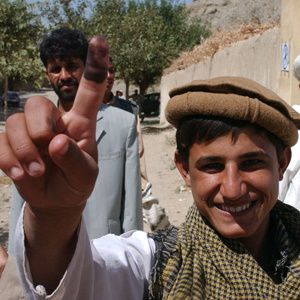The Forced Democracy of Afghanistan
Post-election developments in Iran can influence Afghanistan’s presidential poll. Interview with Houman Dolati.

 Afghanistan election has become sensitive, especially when they are shortly taking place after Iran’s presidential election. How is the course of events developing?
Afghanistan election has become sensitive, especially when they are shortly taking place after Iran’s presidential election. How is the course of events developing?We are witnessing an unprecedented rift between Afghan Mujahideen. A group of them led by Marshal Fahim have joined Hamed Karzai. Others have joined Afghanistan’s United National Front which is headed by Burhanuddin Rabbani. Afghanistan’s future is tied to the ultimate outcome of this split.
Meanwhile, the coalition forces and West prefer Karzai to remain in power, so that they can realize their plans.
Karzai and Ashraf Ghani Ahmadzai are quite active these days, though the main challenge is between Hamed Karzai and Dr. Abdullah Abdullah. Ethnic tensions have become tenser these days, if you know about Afghanistan’s history.
The predictions were that ethnicities having problems with Karzai join the team of Abdullah Abdullah and the United National Front, but things have turned different. Mr. Mohaghegh, who is a major influence in the Shiite society, has turned towards Hamed Karzai. Meanwhile Afghan Uzbeks and their leader Abdol Rashid Dostum have remained silent, though Dostum’s party has endorsed the incumbent president. Also General Atta, governor of the Balkh province, has also supported Hamed Karzai.
Will these supports bring Karzai victory?
I think they have tilted the balance in favor of Karzai, but electoral contests in Afghanistan have their unique features.
How is the freedom of information circulation going to affect the elections?
The excessive freedom of press in Afghanistan, the myriad of radio and television channels, innumerable newspapers and magazines etc. have all had one main effect: information is not communicated face-to-face anymore, by through these media. Unlike previous elections which was determined by how the supporters of candidates could convince citizens in face-to-face encounters, this time the media wave has had the main role, which is a positive thing.
What role does Iran play?
If Iran is going to follow its traditional politics in Afghanistan, it will endorse Tajiks and Mujahideen, and their candidate Abdullah Abdullah. But there is a paradox here regarding Iran’s anti-Americanism. This time, American politicians are not willing to see Karzai win the elections. They support Dr. Abdullah.
Why are Americans supporting Dr. Abdullah?
Because with Karzai their plans were not fully realized in Afghanistan. Americans want to blame the Afghan president for this failure. That’s why they’re backing Abdullah Abdullah.
I don’t think Dr. Abdullah is going to win the elections. The winds are in Karzai’s favor. It was much better for Iran not to side with any candidate and remain impartial. Last election Iran had put all its hopes on Yunus Qanuni, who couldn’t contend with Karzai. Afghan officials were disgruntled by Iran’s partiality. The same thing is happening again. A great part of attacks against Karzai are directed by Iranians and this will detriment Iran’s interests in the future.
Two women are vying for presidency. How do you see this?
Women’s participation is not institutionalized in Afghanistan yet. So their candidacy in this situation is merely symbolic. Masoudeh Jalali entered the election last time but a noticeable number of votes. The Afghan society is deeply patriarchal and religious, which makes it against the presence of women on the political stage.
However, Afghanistan has started its journey towards democracy, and reaching democratic goals calls for participation of women. The parliamentary elections may be more promising. There are fixed number of seats for women in Afghanistan’s parliament and this will produce positive effects sooner or later.
The fixed seats are in fact a reaction to the reign of Taliban, when women were ousted from the realm of politics. The present constitution has adopted a constructive approach to engage women with socio-political affairs. This is one of the instances where the Afghan society is forced to move towards democracy. If we were a democratic society, such proportions were not necessary.
How are Iran’s post-election developments going to influence Afghanistan’s presidential poll?
In many cases, the Afghan society takes Iran as its model. The events which have occurred in Iran after the results were announced may incite some Afghan groups to rise up if their favorite candidate was not elected. And keep in mind that many Afghans possess arms. In general, Iran’s developments influence the course of democracy in the region. People in the Republic of Azerbaijan may also follow Iranians’ model and rise against the life-long presidency of Alyev.

